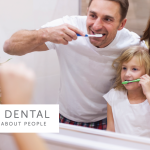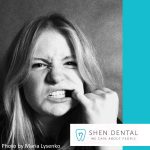If the idea of painful dentistry procedures keeps you from booking an appointment and maintaining strong oral health, we have a few arguments in favor of “Painless Dentistry”.
#1. Dr. Herbert Fisher, A Dentist with a Gentle Hand
We know that the Dentist’s office can be intimidating, that’s why we make it priority to make you feel comfortable. Dr. Fisher’s gentle hand while performing dental work is just one example of how Shen Dental is different than other dental offices.
One lovely client wrote in a review: “I didn’t feel a thing, like a huge enormous (Ok in my mind only) needle was in my mouth at all. He did such a great job, that I feel obliged to share with anyone who wants, needs a great dentist with soft touch.”
Dentistry is meant to help your mouth remain healthy and painless. Dr. Fisher’s hand carries out that task – gently and with care!
#2. Horace Wells Discovers Inhaled Anesthesia
It was in 1844 that Horace Wells, a 19th century dentist, recognized the possible benefits of laughing gas as anesthesia for his dentistry patients. In 1864, the American Dental Association, followed by the American Medical Association in 1870, recognized Horace Wells as the discoverer of anesthesia.
Even before Wells discovered anesthesia, other remedies – such as wine, ether, and a cement gum – were in use as pain relievers!
#3. Hollow Needle and Hypodermic Syringe Invented in 1853
A needle may seem counterintuitive to painless dentistry, however hollow needles and hypodermic syringes have allowed for less painful dental surgeries and enabled experimentation with local agents such as cocaine. And while cocaine was abandoned due to inconsistency and efficacy, as well as it being difficult to obtain, it was a stepping point which Novocain, as well as Epinephrine were eventually to replace in the early 1900’s.
#4. Novocain Discovered in 1904
Following the discovery of Novocain, there have been great developments in the area of local agents and medications that are stronger and faster – including Lidocaine and Halothane (which is still in use today).
#5. Reverse Freezing
Just like we now have quicker anesthetics to ensure you feel no pain during dental treatment, recent advances have given us an agent that reverses the freezing process!
If you dislike having your mouth numb for hours after dental treatment, we can offer you a simple and inexpensive option: an injected drug that speeds up the return of normal sensation following dental work, usually in about an hour!
Even though numbness is a good thing during dental work, for many people it can be uncomfortable and awkward after. So for a completely painless experience, you can unfreeze your mouth faster so you can get back to work, and your life!






